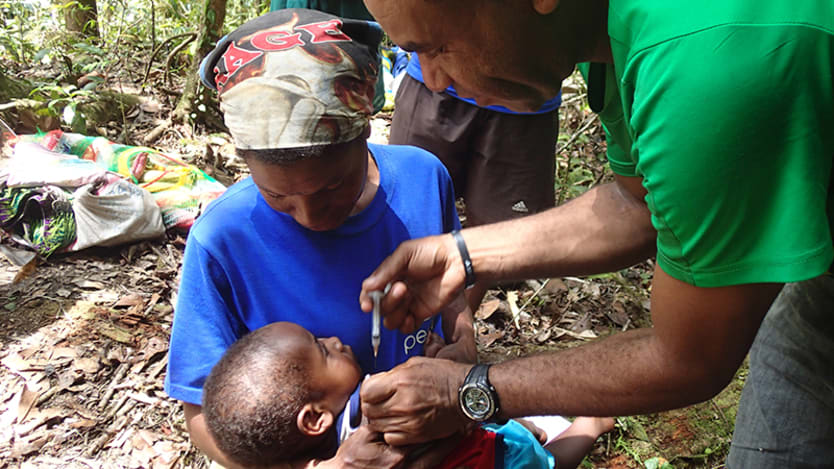
Papua New Guinea has historically been of key strategic importance for Australia. As the country’s closest neighbor, PNG has represented a key line of defense by maintaining a social and political balance between Australia and the South Pacific region. As a result, successive Australian governments have attempted to support — through financial, social, and other schemes — the development, advancement, and stability of PNG’s political systems, society, and economy. This includes continued support to the PNG government and civil society in their efforts to improve national and subnational health outcomes.
“The design of development programs in PNG’s public services — including health, education, and infrastructure — with a specific focus on health programs and related M&E systems, has the capacity to both address and progress health and broader non-health political economy issues simultaneously.”
— Amy Gildea, managing director of international development, Asia Pacific, CoffeyHealth outcomes and the link to health sector constraints
PNG continues to face a range of specific health sector constraints that contribute to poor service delivery and, by extension, an inability to address worsening health outcomes. For example, PNG is known to have one of the highest rates of maternal mortality, with previous demographic surveys identifying a ratio of up to 145 deaths per 100,000 live births in 2017. Skilled health workers are estimated to attend 70% of births.
Vaccine-preventable diseases such as tuberculosis are also significant health problems, alongside malaria, diarrheal and waterborne diseases, and HIV. As of 2019, PNG had the second-highest rate of TB in the Western Pacific region, with new notifications increasing. There are fears that this could worsen with increasing levels of multidrug-resistant and extensively drug-resistant TB.
Thirdly, access to adequate nutrition is a significant health problem. The rate of malnutrition is high among the general population and remains a significant underlying factor for morbidity and mortality in children under age 5. About 23% of children below the age of 5 are underweight. These poor health outcomes have deep negative impacts on learning, productivity, economic growth, and ultimately poverty reduction.
Key service delivery issues
Issues that contribute to and compound poor health outcomes include:
1. Insufficient sustainable investments in the national public health system.
2. A high prevalence of infectious disease, such as tuberculosis and malaria.
3. A high level of dependence on donor and other international assistance.
4. A lack of an effective national or subnational monitoring and evaluation system to track donor health investments and infectious-disease incidence and prevalence.
5. Limited absorptive capacity at both the national and subnational levels.
Challenges remain in the rollout of the PNG government’s decentralization strategy, which relies on the ability of provincial and district health administrations to become effective implementing agencies. These include a limited focus on strategic planning, inefficient and poorly controlled procurement, and limited project management capability. Considering the increased focus on decentralization, increasing capacity and capability in these areas at a subnational level is critical to improving local health outcomes.
Many of these constraints have been identified as products of limited “political will,” including insufficient commitments to public service improvement and a lack of development-level engagement by senior politicians. In turn, political, social, and cultural issues such as corruption, misallocation of resources, and the lack of appropriate and adaptable health education and messaging have resulted in an HIV/AIDS epidemic of a scale and scope unprecedented in the region. As such, it is of vital importance to pursue the political and cultural drivers of change.
Addressing the political and cultural drivers of change through program design
The PNG Constitution calls for the country “to achieve development primarily through the use of Papua New Guinean forms of social, political and economic organization.” Similarly, PNG’s Medium Term Development Plan calls for the development of politically sustainable — not just economically sustainable — development programs. This implies that those development, health, and monitoring and evaluation programs selected and designed for PNG must be integrally aware of their political and economic impact.
In turn, this suggests that such programs must be highly adaptable to local needs, including responsiveness to community norms, cultures, religions, belief systems, and daily routines, as well as recipient economic status. Such considerations will help to ensure that development programs become “owned” by local communities and therefore become sustainable systems to achieve community objectives.
Political drivers of change
• Political leadership
• Political architecture and institutional structures
• Decentralization and subnational governance
• Allocation and accessibility of funding
• Corruption
• Wantok system
• Political advocacy and citizen empowerment
• Fluid coalitions and fragile allegiances
• Bureaucratic staff shortages and limited capacity and training
Cultural drivers of change
• Concepts and classification of illnesses and their severity and epidemiology
• Traditional beliefs and practices related to sorcery, taboo violation, social transgression, witchcraft, and propitiation of spirits
• Health-seeking behavior and cultural concepts linked to pregnancy, birth, child rearing, and sex and marriage (e.g., polygamy and bride price)
• Gender-based violence
• Wantok system
Ideal health interventions in PNG, therefore, should address and measure not just health outcomes, but also the generation of political will for health programs via the production of political gains, social and cultural issues, adoption of local ownership, tackling of corruption, and improvement of regional, multilateral, and bilateral diplomatic and international relations.
In this context — and bearing in mind Australia’s multilevel rationale for the aid program — the design of development programs in PNG’s public services that consider the political and cultural drivers of change, including health programs and related M&E systems, has the capacity to both address and progress health and broader nonhealth political economy issues simultaneously. For example, Australia’s proximity to PNG’s Western Province and related concerns about spread of multidrug-resistant TB could be the impetus to generate a truly effective bilateral partnership that:
1. Promotes better health services and disease surveillance.
2. Addresses political economy issues that continue to negatively affect health management in Western Province, a region of critical importance to Australia from a health security perspective due to its health status and location.
3. Engages in the collaborative design, delivery, and monitoring and evaluation of health programs — including M&E components — in a way that addresses these political economy issues as well as their primary goals. By addressing the constraints that hinder effective program implementation, better health outcomes can be achieved.
Australia’s engagement with PNG should therefore strive to achieve two objectives, both of which are in Australia’s national interest: support the achievement of measurably improved health outcomes in the short term — for humanitarian, economic development, and political reasons — and strengthen the health system over the longer term to be less dependent on external support. Therefore, in the political economy context, development, health, political, and economic considerations all need to be combined.








